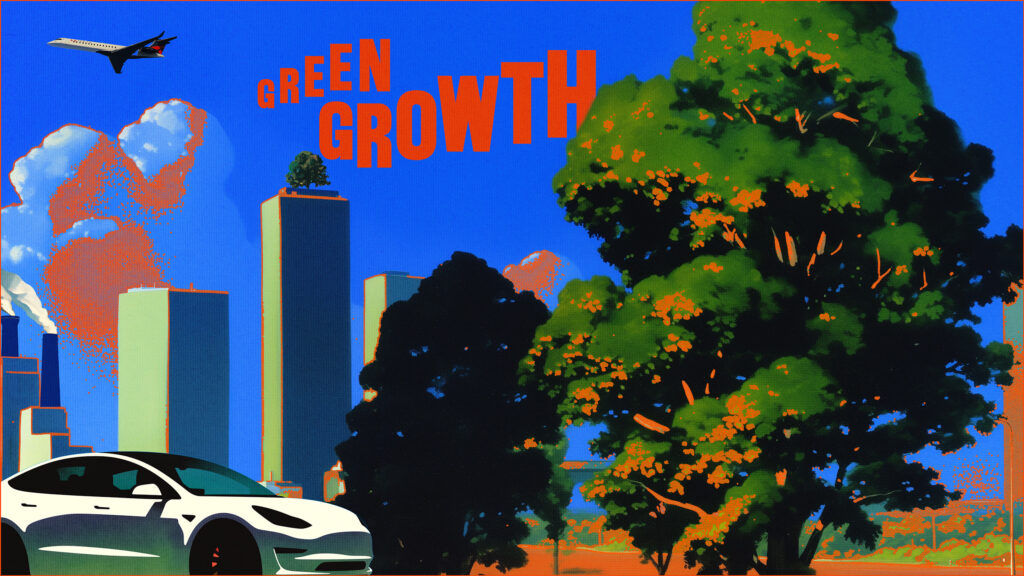In Rethinking Growth, environmental journalist Stefano Cisternino, in collaboration with Icarus Complex Magazine researcher Linda Förster, explores the economic philosophies shaping responses to the climate crisis and social inequalities. This three-part series examines green growth, degrowth, and agrowth, challenging us to reconsider what progress truly means.
Is economic growth killing the planet?
As energy bills soar and climate change threatens our way of life, this question is no longer confined to academic circles. The European Union’s ambitious Green Deal aims to make the bloc climate-neutral by 2050, but it has sparked a heated debate about how our economy needs to change.
Kate Raworth, economist and author of “Doughnut Economics,” encapsulates the urgency of this economic reassessment: “The 21st century’s central challenge is to meet the needs of all within the means of the planet. In other words, to ensure that no one falls short on life’s essentials while ensuring that collectively we do not overshoot our pressure on Earth’s life-supporting systems.” The latest scientific evidence underscores this urgency. The Intergovernmental Panel on Climate Change (IPCC) has emphasized the need for rapid, far-reaching, and unprecedented changes in all aspects of society to limit global warming to 1.5°C above pre-industrial levels. Similarly, the Intergovernmental Science-Policy Platform on Biodiversity and Ecosystem Services (IPBES) has highlighted the accelerating rate of biodiversity loss and its potential to undermine human well-being and long-term economic sustainability. Green growth, has emerged as the prevailing paradigm underpinning the EU Green Deal (EGD), posits that economic expansion can be decoupled from environmental degradation through technological innovation and increased efficiency.
This approach aligns with the EU’s current strategies and has driven progress in certain areas. For instance, in the energy sector, 39% of electricity was generated by renewables in 2022, with the EU on track to meet the lower end of its 2030 target if current acceleration rates are maintained. This perspective is championed by influential thinkers like Mariana Mazzucato, Professor in the Economics of Innovation and Public Value at University College London. In a speech by Carlos Moedas, former EC Commissioner for Research, Science and Innovation, Mazzucato was quoted as saying: “Innovation-led growth is not just about fixing a market failure but also about setting direction and creating new markets. If you just tackle the market failure you can head into the wrong direction.” This view underscores the importance of proactive market shaping in the green transition. However, the efficacy of green growth in achieving comprehensive environmental goals is increasingly questioned.
“… fighting inequality is very tough, and at the moment, oligarchs are creating autocracies around the world to protect their privileges, making any solutions to that problem even more elusive.”
As Helmut Haberl, Professor of Socioecological Metabolism at the Institute of Social Ecology in Vienna, argues in the European Environmental Bureau report “Decoupling Debunked”: “While relative decoupling (reducing environmental impact per unit of economic output) is possible, absolute decoupling (reducing total environmental impact while the economy grows) faces severe constraints, especially at the global level and over longer time periods.” Haberl shares with Icarus Complex that “many people argue in favor of contraction and convergence to sustainable per-capita use levels, and I agree. But again, fighting inequality is very tough, and at the moment, oligarchs are creating autocracies around the world to protect their privileges, making any solutions to that problem even more elusive.” This critique is supported by empirical evidence from the EU’s own environmental performance. The European Environment Agency reports that the EU’s circular material use rate (CMUR) stagnated at 11.5% in 2022, showing an increase of less than one percentage point since 2010. This slow progress, combined with projections for rising material demand by 2030, indicates that the EU is not on track to meet its Circular Economy Action Plan target of doubling the CMUR to 23.2% by 2030. In other words, the EU is struggling to increase its recycling and reuse of materials fast enough to meet its own targets, especially given the expected rise in overall material consumption. Moreover, the EU’s consumption footprint continues to increase, particularly driven by animal-based products, which account for around 70% of the impact. Despite significant investments in electric vehicle technology and infrastructure, transport emissions in 2022 were still only 6% below 2019 levels and by 2024, emissions had plateaued. This indicates that technological improvements alone may not be enough to meet the rapid emissions reductions mandated by the European Green Deal, especially given the rising demand for transport services and the slow adoption of zero-emission solutions in freight and aviation sectors.

Central to the Green Growth paradigm is the pervasive assumption that GDP growth necessarily translates to improved overall economic well-being. This assumption has been increasingly challenged by economists and policymakers alike. Joseph Stiglitz, Nobel laureate in economics, critiques the overreliance on GDP: “GDP is not a good measure of economic performance. It’s not a good measure of well-being. What we measure affects what we do, and if we measure the wrong thing, we will do the wrong thing.” Helmut Haberl concurs with Stiglitz, sharing with Icarus Complex that “there are many people who do not really gain anything when GDP is growing, and we know that growing inequality is a major detriment to social wellbeing.” Indeed, while global GDP has more than doubled since 1990, this growth has been accompanied by rising inequality in many countries and unprecedented environmental degradation. It’s crucial to examine what the concept of growth is predicated on. GDP, our primary measure of economic growth, simply quantifies the total value of goods and services produced in an economy over a specific period. However, this metric fails to capture many aspects of economic and social well-being, including income distribution, environmental degradation, or the quality of jobs created. This narrow focus on GDP as a measure of progress has led to policies that often prioritize short-term economic gains over long-term societal and environmental well-being.
“GDP is not a good measure of economic performance. It’s not a good measure of well-being. What we measure affects what we do, and if we measure the wrong thing, we will do the wrong thing.”
Recognizing these shortcomings, economists and policymakers have begun exploring more comprehensive measures of societal progress. For instance, the United Nations’ Human Development Index (HDI) incorporates education and life expectancy alongside economic indicators. Bhutan’s Gross National Happiness index goes further, measuring nine domains including psychological well-being, health, education, cultural diversity, and ecological resilience. In the EU, the ‘Beyond GDP‘ initiative aims to develop indicators that are more inclusive of environmental and social aspects of progress. For citizens, these alternative approaches could lead to policies that more directly target improvements in quality of life, from better work-life balance to cleaner environments and stronger communities. However, shifting from GDP-centric policymaking to a more holistic approach remains a significant challenge, requiring fundamental changes in how we conceptualize and measure societal success.
While the EU Green Deal represents a significant step towards a sustainable future, the persistent challenges posed by absolute decoupling, rising material demand and consumption, and the inadequate reduction of emissions suggest that technological innovation alone no longer suffices. The debate over green growth raises a fundamental question: Can a GDP-centric economic paradigm provide a livable future for all, or must we shift to a new framework; one that entirely decenters economic growth, focusing instead on the resources available and their equitable and sustainable distribution?
